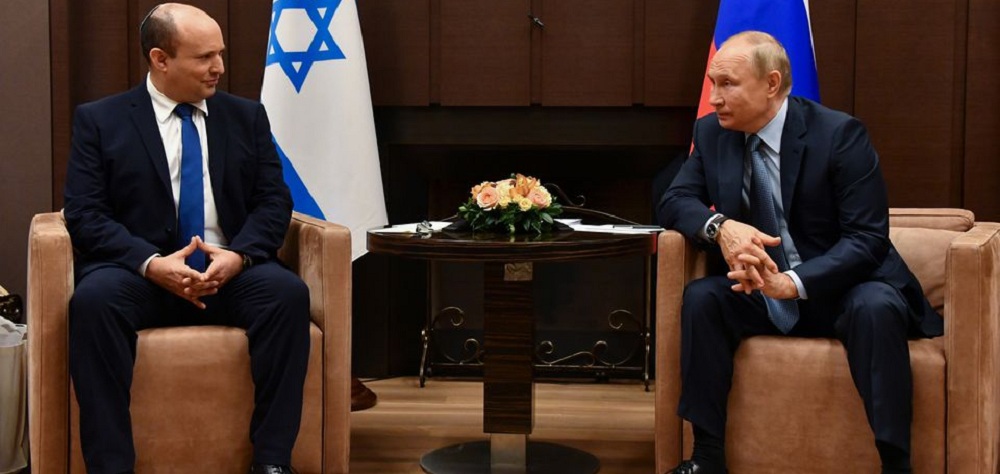Alwaght- The Russian-Ukrainian war obviously demonstrated the geopolitical divergence of interests in Eastern Europe. It at the same time is an important and efficient tool to analyze the international dynamics of power in relation to many countries that are directly or indirectly involved in this conflict. One of the best examples is the West Asian political equations and the relations between Tel Aviv and Moscow.
At the beginning of the war and the West's attempt to create a united international front against Russia, the Israeli regime, which is recognized as the West's most important ally in the region, initially did not show a green light to the Western request to join the anti-Russian alliance.
While in 2021 Kiev expressed interest in procurement of Israeli-made Iron Dome air defenses to boost its defense as it felt war was coming and the American government for months tried to persuade Tel Aviv to provide them to the Ukrainians, Prime Minister Neftali Bennett’s government declined to supply them for the fear of damage to Tel Aviv-Moscow relations.
At the same time, the Israeli government declined to condemn a Russian attack on the so-called Holocaust memorial in Kharkiv in the east of the county, while Bennett is himself an orthodox Jew and from the hard-line right.
The Israeli security concerns in the current complicated regional conditions, which are aggravated by the US reduction of role in West Asia, Iran's toehold gain in Syria, and power gain of resistance groups in Palestine and Lebanon, had the biggest influence in conservative stance of the Israeli regarding the Western pressures on Russia, especially that by deploying forces in Syria during the war Moscow practically became a northern neighbor of Tel Aviv and the Israelis had specially counted on the Russian guarantees about security threats to Israel caused by Syrian developments.
It was also initially thought that such conservative stance could be due to the strong presence of Russian-speaking Jewish communities in the occupied Palestinian territories, as 1.3 million of Israel's population of about 8 million are Russian-speaking. In 2015, the CBS network estimated that 53 percent of immigrants to the Palestinian territories came from the former Soviet Union, mainly from Russia and Ukraine. Reports suggest that in the 1990s alone, 900,000 people immigrated to occupied territories from the former Soviet Union.
But this conservative approach to Russian campaign in Ukraine has changed over time, with Israeli Foreign Minister Yair Lapid saying in a strong-toned statement that Russia's attack on Ukraine is a serious violation of international order and "Israel condemns it."
The Israelis also announced accepting Ukrainian refugees and voted in favor of the UN General Assembly resolutions on March 2 and 24 condemning the Russian operation.
The result of this change in attitude has been the sharp reaction of the Russians and the escalation of tensions in bilateral relations in recent days and weeks.
Russia's ambassador to Tel Aviv on Friday condemned the latter for its anti-Russian remarks after Tel Aviv voted in favor of suspending Moscow at the UN Human Rights Council.
The Russian foreign ministry described Lapid's statement as "regrettable" and, in retaliation, accused Israel of using the Ukraine conflict as a factor in diverting global attention from the Palestinian developments.
Moscow also condemned in an extremely harsh and unprecedented stance the Israeli occupation of the West Bank and the siege on the Gaza Strip.
"It is also noteworthy that... the longest occupation in the post-war world history is carried out with the tacit connivance of the leading Western countries and the actual support of the United States,” a Russian statement said.
The statement came as on February 23, Russia had summoned the Israeli ambassador, strongly condemning the Israeli annexation of the Syrian Golan Heights.
This broadening confrontation bears witness to the fact that the purportedly useful bilateral agreements to dissuade Tel Aviv from fully supporting the pro-Ukrainian efforts of the US have gone nowhere. For example, since the war started in Ukraine, Russia several times warned to scrap the agreements with the Israeli regime in Syria and close the Arab country's skies to the Israeli warplanes.
With the Russian-Western confrontation unfolding amid Ukrainian war continuation, Putin is expected to review his policy on West Asian cases, especially the cooperation with Tel Aviv in Syria crisis.



























